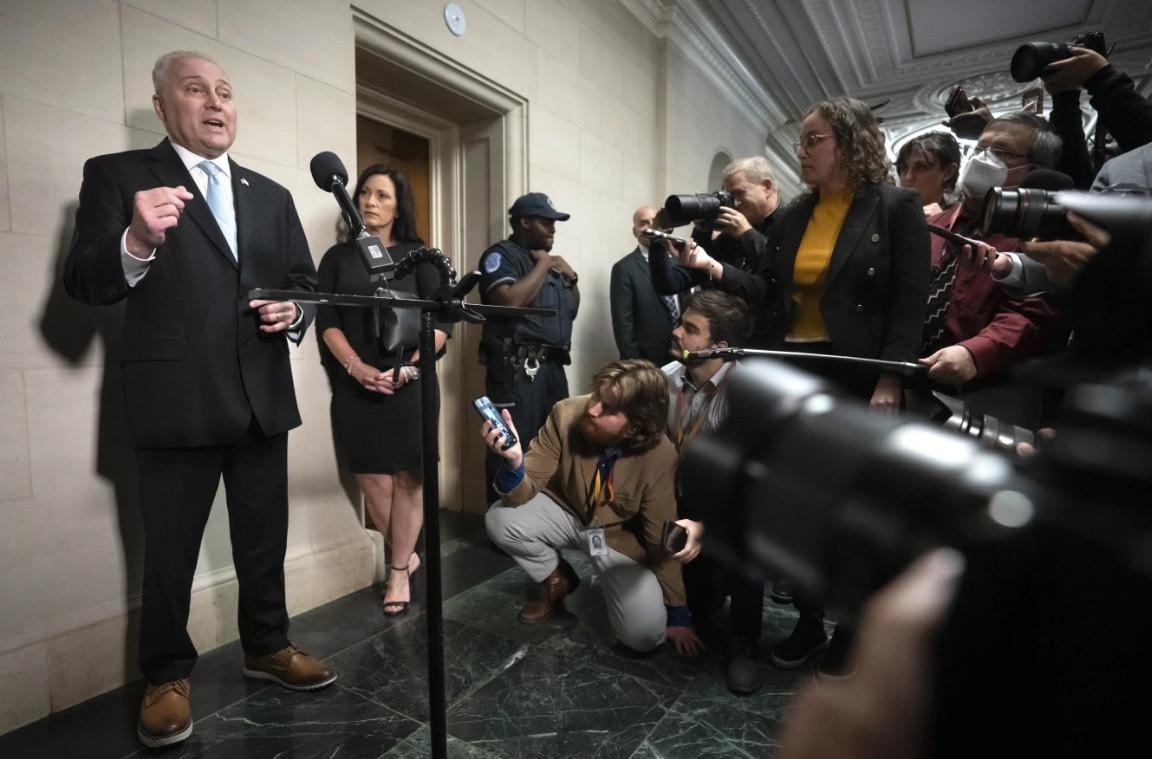
Republicans nominated Rep. Steve Scalise on Wednesday to be the next House speaker but struggled to quickly unite their deeply divided majority and elect the conservative in a public floor vote after the historic ousting of Rep. Kevin McCarthy from the job.
In private balloting at the Capitol, House Republicans narrowly pushed aside Ohio Rep. Jim Jordan, the firebrand Judiciary Committee chairman, in favor of Scalise, the current majority leader. The Louisiana congressman, who is battling blood cancer, is seen as a hero to some after surviving a shooting on lawmakers at a congressional baseball game practice in 2017.
“We have a lot of work to do,” Scalise said afterward.
A floor vote of the whole House was expected, but tensions are still running high among Republicans who have brought the House to a standstill with bitter infighting after McCarthy’s stunning removal last week. The House was gaveled into a brief session, then broke indefinitely, with next steps uncertain.
It’s an extraordinary moment of political chaos at a time of uncertainty at home and crisis abroad, moving into a second week without a House speaker. Just 10 months after Republicans swept to power aspiring to operate as a team and run government more like a business, the GOP majority has drifted far from that goal.
“We need to make sure we’re sending a message to people all throughout the world, that the House is open to doing the people’s business,” Scalise said.
What's uncertain is whether lawmakers who supported Jordan, the hard-liner backed by Donald Trump, will throw their support to Scalise in what is sure to be a close vote of the full House. Democrats are set to oppose the Republican nominee, easily nominating their leader, New York Rep. Hakeem Jeffries.
Jordan said little after the vote, only that the GOP majority "is divided.”
But Jordan did offer to give Scalise a nominating speech on the floor, in what would be a show of support during a vote.
A centrist leader, Rep. Don Bacon, R-Neb., said, “We do need to get a speaker in place so we can govern.”
“What we should have heard today after the vote count was, 'I will heartily support Steve. Let's get behind him,'” Bacon said. “We did not hear that.”
Americans are watching. One-quarter of Republicans say they approve of the decision by a small group of Republicans to remove McCarthy as speaker. Three in 10 Republicans believe it was a mistake, according to a poll from The Associated Press-NORC Center for Public Affairs Research.
At the White House, presidential press secretary Karine Jean-Pierre said, "We want to see the chaos be done with so that we can deliver for the American people.”
The hard-right coalition of lawmakers that ousted McCarthy, R-Calif., has shown what an oversize role a few lawmakers can have in choosing his successor.
In a floor vote, Scalise would need to amass votes from almost all Republicans to overcome the Democratic opposition. Usually, the majority needed would be 218 votes, but there are currently two vacant seats, dropping the threshold to 217.
Many Republicans want to prevent the spectacle of a messy House floor fight like the grueling January brawl when McCarthy became speaker.
Behind closed doors, the Republicans voted to set aside a proposed a rules change that would have tried to ensure a majority vote before the nominee was presented for a full floor vote.
Without the rules change, the Republican lawmakers would be expected to agree to a majority-wins process. But several lawmakers announced they were not supporting Scalise.
Rep. Marjorie Taylor Greene, R-Ga., said she backed Jordan in the private ballot and would do so in the floor vote. Rep. Thomas Massie, R-Ky., said he let Scalise know “he doesn’t have my vote on the floor."
Neither Scalise nor Jordan was seen as the heir apparent to McCarthy, who was removed in a push by the far-right flank after the speaker led Congress to approve legislation that averted a government shutdown.
All three men have been here before. In 2018, they were similarly vying for leadership, with McCarthy and Scalise extending the rivalry to this day.
Scalise was in line for the job this time after McCarthy's ouster, but faced a challenge from Jordan, a founding member of the Freedom Caucus, who was viewed as a more hard-edged option.
Jordan is known for his close alliance with Trump, particularly when the then-president was working to overturn the results of the 2020 election, leading to the Jan. 6, 2021, attack on the Capitol. Trump backed Jordan's bid for the gavel.
Several lawmakers, including Rep. Matt Gaetz, R-Fla., who engineered McCarthy's ouster, said they would be willing to support either Scalise or Jordan.
“Long live Speaker Scalise,” Gaetz said after the vote.
McCarthy had briefly floated a possible comeback earlier this week but the eight hard-liners who helped engineer his removal showed no signs of budging. He told his colleagues late Tuesday not to put his name forward for a nomination.
At the speaker's office, where McCarthy's name has still been out front since his ouster last week, crews were seen carting boxes and artwork out of the stately suite in the Capitol.
For now, Rep. Patrick McHenry, R-N.C., who was named as the speaker pro-tempore, is effectively in charge. He has shown little interest in expanding his power beyond the role he was assigned — an interim leader tasked with ensuring the election of the next speaker.
The role was created in the aftermath of the Sept. 11, 2001, terrorist attacks to ensure the continuity of government. McHenry's name was at the top of a list submitted by McCarthy when he became speaker in January.